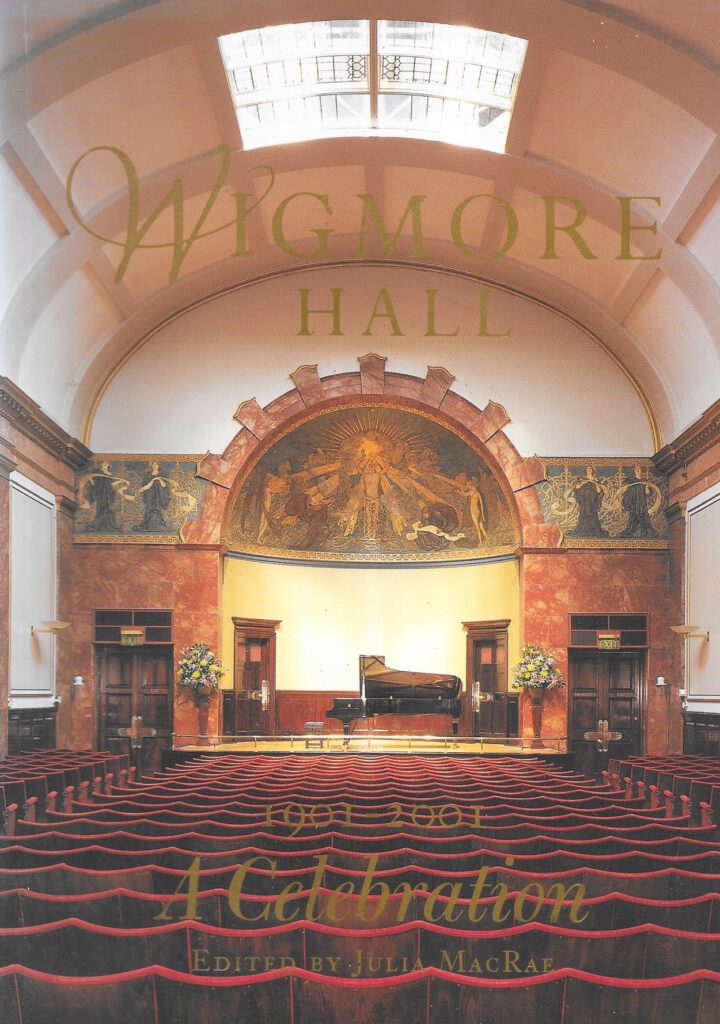
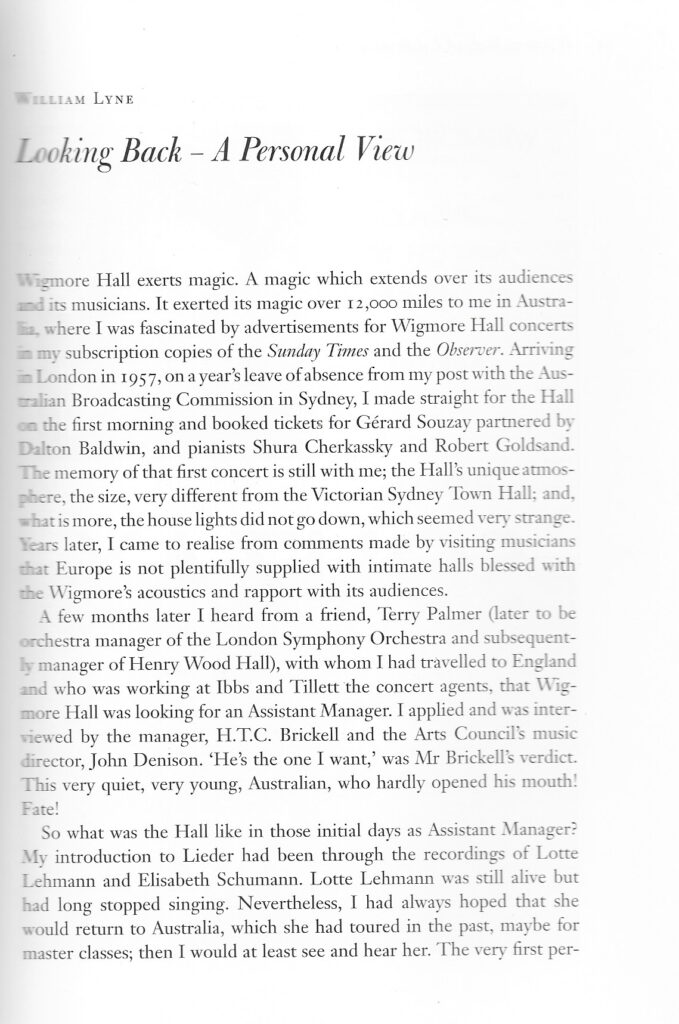
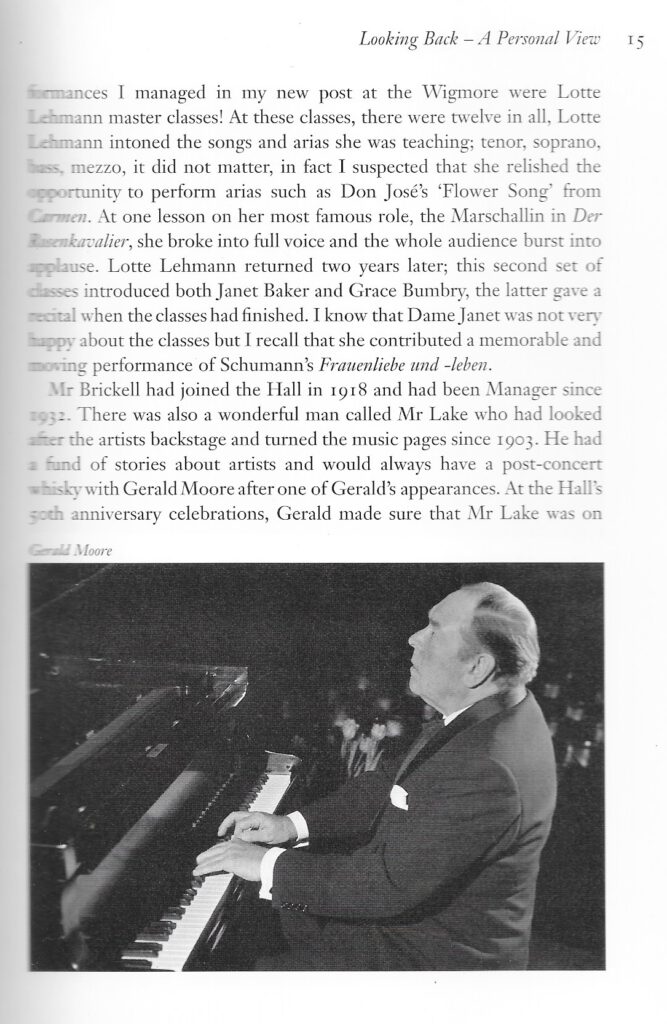
Music: Lotte’s Secrets
Monday, Jan. 13, 1958 TIME Magazine (an article referring to Lehmann’s master classes in 1957)
“How can it really be that I was once the little girl and that one day I will be the woman?…How can it happen, when, after all, I always remain the same?” So muses the Marschallin, the wise, witty and autumnal beauty in Richard Strauss’s Der Rosenkavalier. For years the part was the special glory of Opera Singer Lotte Lehmann, and its touch of middle-aging melancholy took on a special meaning for her as Soprano Lehmann herself gradually grew too old to sing it (her last Metropolitan Opera appearance in the role was in 1945).
Last week 69-year-old Lotte Lehmann proved to British radio audiences that, in the sense of the Marschallin’s words, she is still the same. In a dozen “master classes” last fall, retired Soprano Lehmann coached 30 students from London’s Opera School and young professionals from the Royal Opera House. The Rosenkavalier classes—tape-recorded and now broadcast over BBC—displayed her old magic and the extraordinary musical intelligence that helped make Lotte Lehmann one of the great singers of her time.
One Is Enough. British radio listeners could hear her remarkable performance, but could not see Teacher Lehmann as she had appeared during the classes on the stage of London’s Wigmore Hall—her grey hair knotted in a bun, her handsome, heavy-jawed face lit with flashes of the passion she once sang into her great roles. She circled the stage gesturing, commenting, coaxing. She was trying, she told the singers, to help them develop individuality, not to turn them into “a dozen other Lehmanns” (“I have always enough trouble with this one”).
With endless patience and dry irony, she probed the motivations of the characters. On Octavian: “He had thought that his love for the Marschallin was eternal—he is very young.” When the Marschallin suggests that she will one day end the affair, and easily, “this is really the last straw for him. [He thinks.] ‘Hasn’t she ever loved me?’ …He doesn’t understand this woman at all.” On the Marschallin: “She has not a drop of sentimentality in her whole makeup, not at all. Always she has this humorous superiority which carries her through everything…She knows that now the hour has come that Octavian will leave her. It has come a little bit earlier than is pleasant for her, but she is master of the situation.”
Occasionally Lehmann interrupted a singer with a general comment (she recalled Strauss’s own advice to her: “Have the courage to stand still”), sometimes spoke delightedly of a favorite passage: “This is one of the wonderful moments that the conductor has to wait for the singer.” Said one of her awed young pupils: “I have learned just by being near her. She must have been a fantastically great artist.”
Gay Goodbye. Back home in Santa Barbara, Calif., Lotte Lehmann coaches only a few singers (“just to keep it up”) during the winter months. But in summer she is active as both teacher and opera producer at Santa Barbara’s Music Academy of the West. She also spends a lot of time painting and making glass mosaics of her own design. Next fall Lotte Lehmann may go to Australia to repeat her teaching series.
She will no longer sing, even for friends. The Wigmore Hall classes, though, brought an exception. As one reporter tells it: “She was demonstrating the ironic gaiety with which the Marschallin should bid Octavian goodbye. Suddenly, a sound went up which did not come from either of the very promising pupils of the Opera School. In a second we realized what had happened; Madame Lehmann had forgotten that she had no voice. The applause went on for about a minute while she brushed aside the moment of oblivion with a good-humored wave of her hand.”
Says Lotte Lehmann herself, with a candor worthy of the Marschallin: “My voice is a shadow of itself. I hate to have shadows around me.”
Monday, Jan. 13, 1958
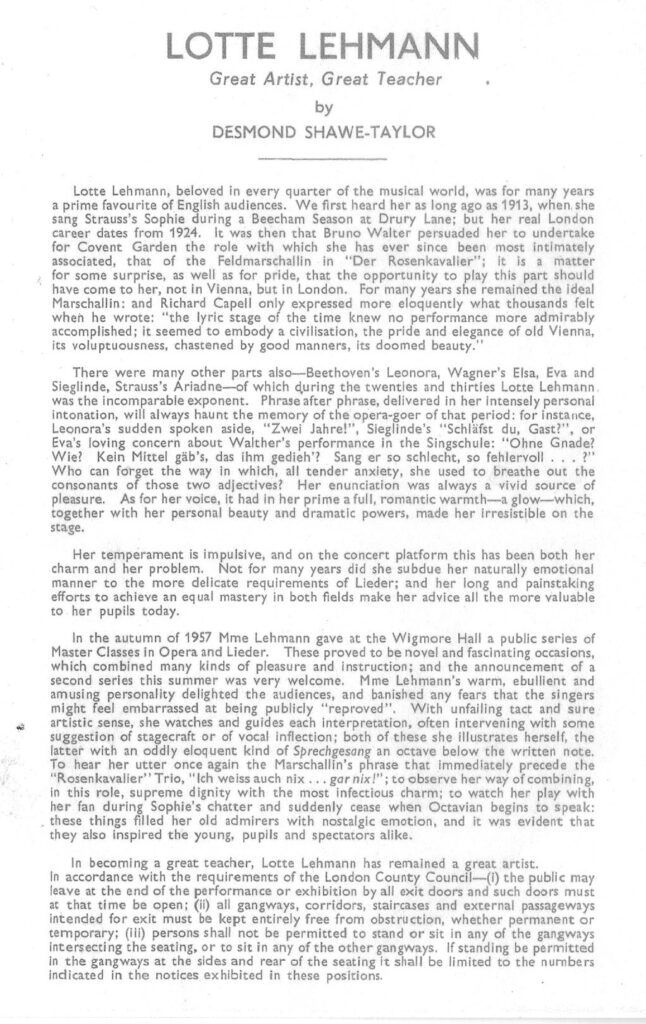
From his 2019 book Listening through the lens, Chrisopher Nupen remembers these Wigmore Hall master classes with Lehmann. “Her masterclasses at the Wigmore Hall became the talk of the musical fraternity. I was present at all of them and always sat in the front row with [Lehmann’s Vienna friend] Betty Mont. At the end of one of the classes an astonishing thing happened. Here is an account of it by the actor and author Robert Speaight in The Tablet dated October 12th 1957: ‘Suddenly, a sound went up which did not come from either of the very promising pupils of the Opera School. In a second we realized what had happened; Madame Lehmann had forgotten that she had no voice. The applause went on for about a minute while she brushed aside the moment of oblivion with a good-humored wave of her hand.’ What Mr. Speaight did not know was why and how that happened.
“On the previous day Lotte had given me a photograph of herself, taken, a few days earlier, by Lotte Meitner-Graf in her Bond Street studio. Lotte had written out on the photograph, on a deliberately wavy stave, the notes but not the words of the Marschallin’s great sign of impending separation from her youthful lover, Octavian (Quinquin). Heut oder Morgen, oder den übernächsten Tag. Today or tomorrow or the day after, her lover would leave her for a younger woman.
“As the line approached, Lotte turned from her pupil and glanced at me and Betty in the front row. She turned back at her pupil. Then it happened, she suddenly gave tone to those words and I had never in my life heard such sounds. Mr Speaight’s account of it, aside from the impact on him personally, is a pale shadow of what actually happened.
“The sounds that Lotte uttered came from another world and quite literally shook and shocked me. It was the tremendous volume which seemed to make the very walls shake. But there was something else, something visceral in the quality of the sound that I had never heard before. She sang Heut oder Morgen, oder den übernächsten Tag and looked at me, trembling, in the front row. I must have had the widest eyes she had ever seen. It stirred something inside me, something physical, something real that I had not met before. I was totally floored. I was still on edge when the class ended.”
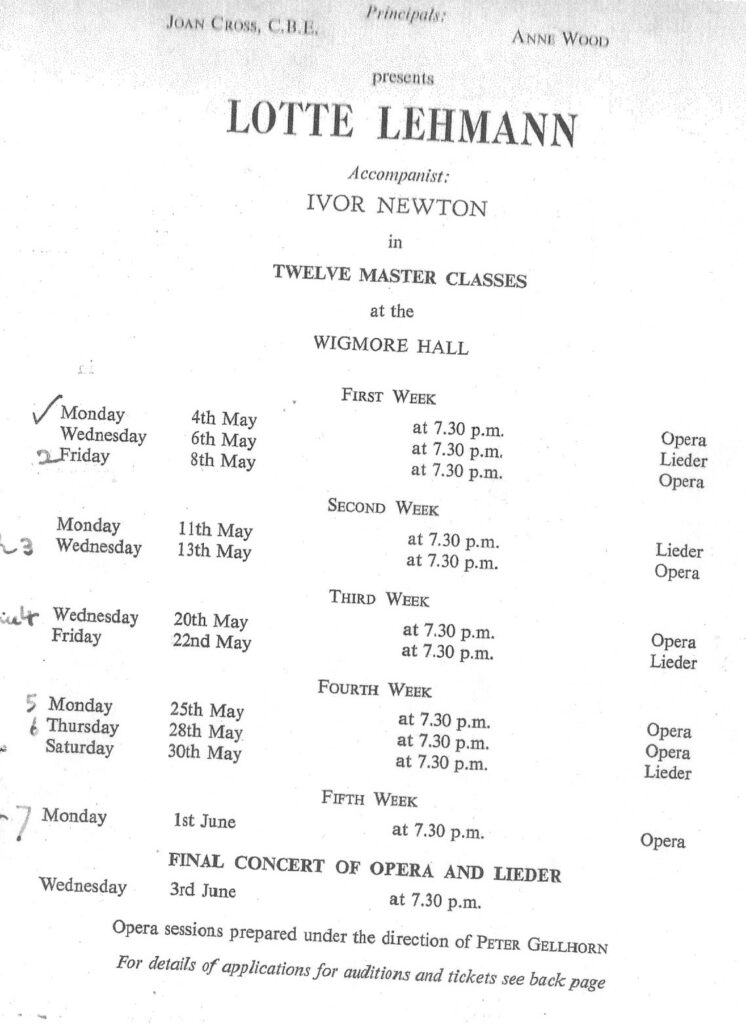
Music: Lotte’s Secrets
TIME magazine: 13 January 1958
“How can it really be that I was once the little girl and that one day I will be the woman?…How can it happen, when, after all, I always remain the same?”So muses the Marschallin, the wise, witty and autumnal beauty in Richard Strauss’s Der Rosenkavalier. For years the part was the special glory of Opera Singer Lotte Lehmann, and its touch of middle-aging melancholy took on a special meaning for her as Soprano Lehmann herself gradually grew too old to sing it (her last Metropolitan Opera appearance in the role was in 1945).
Last week 69-year-old Lotte Lehmann proved to British radio audiences that, in the sense of the Marschallin’s words, she is still the same. In a dozen “master classes” last fall, retired Soprano Lehmann coached 30 students from London’s Opera School and young professionals from the Royal Opera House. The Rosenkavalier classes—tape-recorded and now broadcast over BBC—displayed her old magic and the extraordinary musical intelligence that helped make Lotte Lehmann one of the great singers of her time.
One Is Enough. British radio listeners could hear her remarkable performance, but could not see Teacher Lehmann as she had appeared during the classes on the stage of London’s Wigmore Hall—her grey hair knotted in a bun, her handsome, heavy-jawed face lit with flashes of the passion she once sang into her great roles. She circled the stage gesturing, commenting, coaxing. She was trying, she told the singers, to help them develop individuality, not to turn them into “a dozen other Lehmanns” (“I have always enough trouble with this one”).
With endless patience and dry irony, she probed the motivations of the characters. On Octavian: “He had thought that his love for the Marschallin was eternal—he is very young.” When the Marschallin suggests that she will one day end the affair, and easily, “this is really the last straw for him. [He thinks.] ‘Hasn’t she ever loved me?’ …He doesn’t understand this woman at all.” On the Marschallin: “She has not a drop of sentimentality in her whole makeup, not at all. Always she has this humorous superiority which carries her through everything…She knows that now the hour has come that Octavian will leave her. It has come a little bit earlier than is pleasant for her, but she is master of the situation.”
Occasionally Lehmann interrupted a singer with a general comment (she recalled Strauss’s own advice to her: “Have the courage to stand still”), sometimes spoke delightedly of a favorite passage: “This is one of the wonderful moments that the conductor has to wait for the singer.” Said one of her awed young pupils: “I have learned just by being near her. She must have been a fantastically great artist.”
Gay Goodbye. Back home in Santa Barbara, Calif., Lotte Lehmann coaches only a few singers (“just to keep it up”) during the winter months. But in summer she is active as both teacher and opera producer at Santa Barbara’s Music Academy of the West. She also spends a lot of time painting and making glass mosaics of her own design. Next fall Lotte Lehmann may go to Australia to repeat her teaching series.
She will no longer sing, even for friends. The Wigmore Hall classes, though, brought an exception. As one reporter tells it: “She was demonstrating the ironic gaiety with which the Marschallin should bid Octavian goodbye. Suddenly, a sound went up which did not come from either of the very promising pupils of the Opera School. In a second we realized what had happened; Madame Lehmann had forgotten that she had no voice. The applause went on for about a minute while she brushed aside the moment of oblivion with a good-humored wave of her hand.”
Says Lotte Lehmann herself, with a candor worthy of the Marschallin: “My voice is a shadow of itself. I hate to have shadows around me.”
